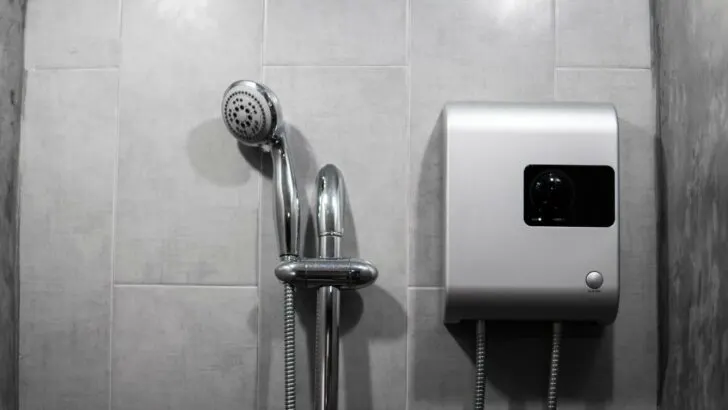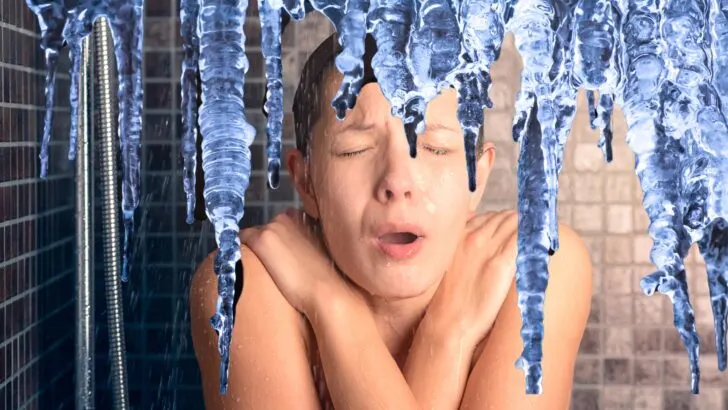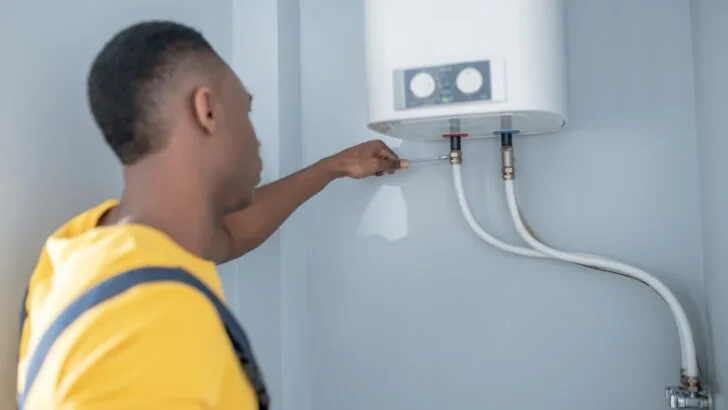Tankless water heaters (sometimes referred to as on-demand water heaters) are popular for their energy efficiency and continuous hot water supply. But like any appliance, they can experience problems. Since this type of water heater is becoming more and more common in RVs (and since no one likes to shower in cold water), we thought we’d lay out a guide to troubleshooting and solving typical RV tankless water heater problems.
What Is an RV Tankless Water Heater?
Unlike a traditional RV water heater that has a 6-10 gallon reservoir in which water is stored and heated (and later moved through your RV’s plumbing system with the aid of a water pump or city water pressure), a tankless water heater doesn’t store water in a small tank at all. Water is instead instantly heated as it passes through the tankless heater.
The only limitations to how much hot water you can use are how much water you can access and the amount of fuel you have for heating. This means that (especially) if you’re boondocking, you’ll need to be mindful of your water use. Without water/sewer connections, you’ll want to be vigilant to avoid draining your fresh water tank or overfilling your gray tank.
But if you’re connected to a city water source and sewer (at a campground, for example, with a full hook-up), your tankless water heater won’t ever run out of hot water. You’ll have an endless supply, unless you run out of fuel to power the water heater (either propane or diesel).

With a tankless water heater, not only is there no multi-gallon tank of water to carry around, but your access to water is the only limitation to how much hot water you can have.
Typical RV Tankless Water Heater Problems and Solutions
Most tankless water heaters installed in RVs are made/sold by Girard, Atwood, Suburban, Truma, and Furrion. There are other brands, but these are the most popular.
Here are the most common RV tankless water heater problems you might experience with a tankless RV water heater, the typical causes of those issues, and how to troubleshoot and hopefully solve the issues to bring continuous hot water flowing through your RV water lines again.
No Hot Water
If your RV tankless water heater problem is leaving you without hot water, there are a few likely causes to troubleshoot:
- Insufficient water flow
- Clogged inlet filter
- Ignition failure
Troubleshooting Steps:
- Check for adequate water pressure at the spigot (campgrounds can have varying water pressures, which is why all RVs need a water pressure regulator).
- Check the pressure regulator that’s installed in your water supply line to limit the water pressure going into your RV (pressure regulators can fail, which might result in insufficient pressure or flow being passed to the RV).
- Turn the water on and ensure that all faucets are completely open.
- Clean the water heater’s inlet filter (if so equipped) to remove any debris.
- Check for error codes on the heater’s control panel and consult the manual for specific troubleshooting steps based on the error codes shown.
- Ensure that your LP gas supply is sufficient and that the ignition system is functioning properly.
- WATER REGULATOR: Versatile water regulator is compatible with standard campers, RV's, trailers, and more
- IDEAL PRESSURE: Regulates water pressure to your preference with pressure gauge
Here’s an example of how to clean and replace a Furrion RV tankless water heater filter:
Insufficient Hot Water
If you’re getting some hot water, but not the desired/expected flow, there are a few causes to rule out:
- Inadequate LP gas supply
- Mineral scale buildup inside the heat exchanger
- Incorrect water temp setting
Note: It’s important to remember that an RV can be exposed to many different water qualities as you travel. There are often calcium, lime, and other minerals present in hard water, and over time, they build up, causing sediment that can restrict the flow of water through the heat exchanger. This can lead to overheating and leaks, which is why tankless water heaters need to be flushed at least once a year, perhaps more if you travel full-time.
Insufficient hot water troubleshooting steps:
- Verify that the gas supply is adequate and the gas pressure meets the manufacturer’s specifications.
- If mineral scale is suspected, flush the system with a descaling solution following the manufacturer’s instructions.
- Adjust the temperature setting according to your preference, but be cautious not to set it too high to avoid scalding.
Water Temperature Fluctuations
If you’re experiencing the annoying symptom of temperature fluctuations in the hot water coming from your RV tankless water heater, check these possible culprits:
- Inconsistent water flow
- Temperature sensor issues (Note: some tankless water heaters have more than one temperature sensor, while other simpler versions have no temp sensor at al, but instead use a high temp limit switch. Check your owner’s manual for info on your particular tankless water heater.)
- Scaling in the heat exchanger (See RV tankless water heater problem #2 above.)

There’s nothing more shocking (or less fun!) than having the temperature of your shower fluctuate from hot to cold!
Troubleshooting Steps:
- Check for consistent water flow by ruling out any blockages or restrictions in the plumbing (start at the spigot and work your way toward the water heater).
- Clean or replace the temperature sensor if applicable.
- If scaling is the issue, perform a thorough descaling of the heat exchanger (refer to your owner’s manual for specific instructions regarding your brand/model of tankless RV water heater).
Heater Not Igniting
Inside a tankless water heater there’s a burner that ignites when the system detects a demand for hot water (i.e. a faucet was opened, turned to “Hot”). The cold water passes over a heat exchanger that heats the water immediately.
If your RV tankless water heater isn’t igniting, the problem could be as simple as a need to replenish your LP gas supply. Generally, an ignition failure indicates one of two things – either the gas supply is low or the valves for either the gas or water are closed.
The possible causes for the above situations are:
- Gas supply issues
- Ignition system malfunction (Note: tankless water heaters use a burner lit by electronic ignition, so there’s no standing pilot light)
- Blocked burner orifice
Troubleshooting Steps:
- Verify that there is gas flow.
- Check for error codes (or a blinking pattern on an error light) on the display panel and follow the manufacturer’s instructions.
- Have the burner orifice on your LP system cleaned to ensure proper gas flow (if the flow is too low/high it can essentially blow itself out, relight, or throw a code).
Odd Noises
There are a couple of reasons why you might hear odd noises coming from your RV tankless water heater:
- Air in the gas line
- Air in the cold water supply line(s)
- Scaling or sediment in the heat exchanger
Troubleshooting Steps:
- Bleed air from the gas line by turning on another propane-powered appliance, like a burner on your stove top, until the air is purged.
- Bleed air from the water lines by turning on a water faucet until the air is purged (toggle between cold, warm, and hot to bleed air from both the cold and hot water lines).
- If scaling or sediment is suspected, perform a thorough system flush (follow your brand/model’s instructions in your owner’s manual).
Leaking
The last thing anyone wants in an RV is leaking! If you’re experiencing leaking from your RV tankless water heater, there are a few things that might be happening, particularly if the unit is older. Considering the constant movement of RVs over the road, however, the first thing to check for would be loose connections.

The most likely culprit of an RV tankless water heater leak is a loose connection. The good news is that this is also the simplest of repairs.
Possible causes of leaking from your RV’s tankless water heater:
- Loose connections
- Damaged seals
- Corroded pipes
Troubleshooting Steps:
- Inspect all connections for tightness.
- Replace damaged seals.
- Address any corrosion on pipes promptly.
Error Codes on Display
Error codes on your tankless water heater’s control panel may indicate a malfunction or they may simply indicate a need to reset the system. (This is often as simple as holding down a reset button. Refer to your owner’s manual for a simple way to reset your unit.)
Possible Causes:
- System malfunctions
- Sensor issues
Troubleshooting Steps:
- Refer to the manufacturer’s manual for error codes and their meanings.
- Follow the recommended steps for each specific error code.
Regular Maintenance
The old saying, “An ounce of prevention is worth a pound of cure” certainly holds true for your RV’s water heater. Performing regular maintenance on any appliance as recommended by the manufacturer is the best way to avoid problems. This may include flushing the system, checking and cleaning any filters you have, and inspecting components for signs of wear or corrosion. As always, regular maintenance is the best way to avoid potentially expensive repairs or replacements.
Important: Always follow safety guidelines and turn off the power supply before attempting maintenance or repairs. Also, if you’re unsure about any troubleshooting steps, or if your issue persists, contact the manufacturer’s customer support or reach out to a professional RV technician for assistance.
If your RV has a traditional RV water heater, you can check out our original post on RV water heater troubleshooting.
For more information on RV tankless water heaters and on how the two types of water heaters differ, see our post on the RV tankless water heater vs traditional RV water heater.
Free RVing Tips, Tricks, Reviews & Giveaways
As 20-year full-timers, we share everything we’ve learned about RVing over the years. Join our online community to receive a wealth of great RVing knowledge delivered daily to your inbox.
Whether you’re a new RVer or a seasoned full-timer, you’ll love the wide range of RVing topics we cover. Don’t miss a single article or any of our famous Giveaways. Subscribe to our newsletter today!


